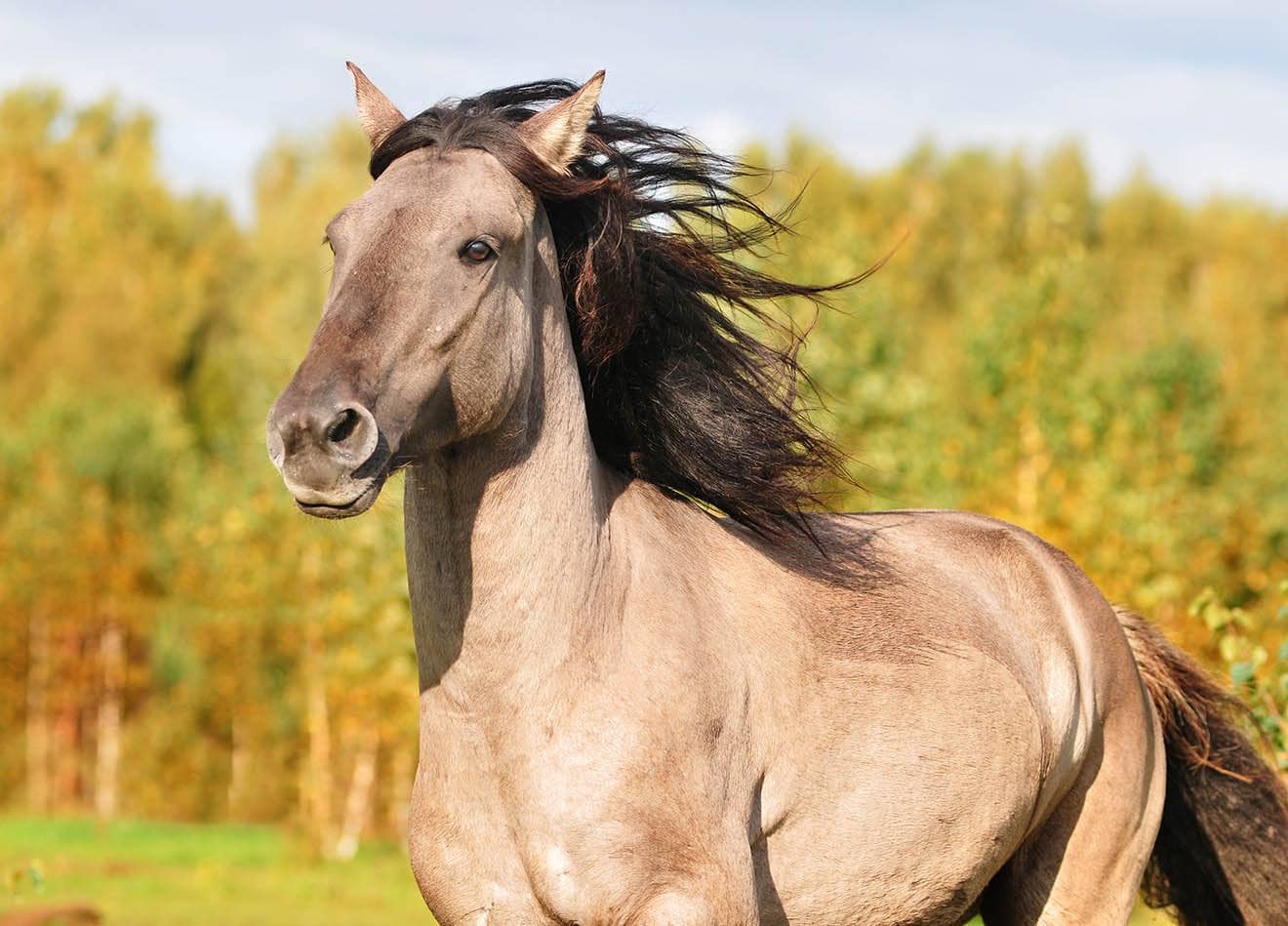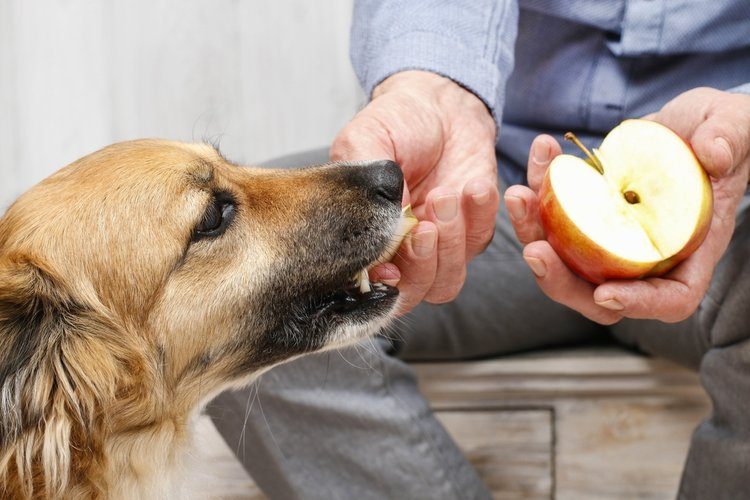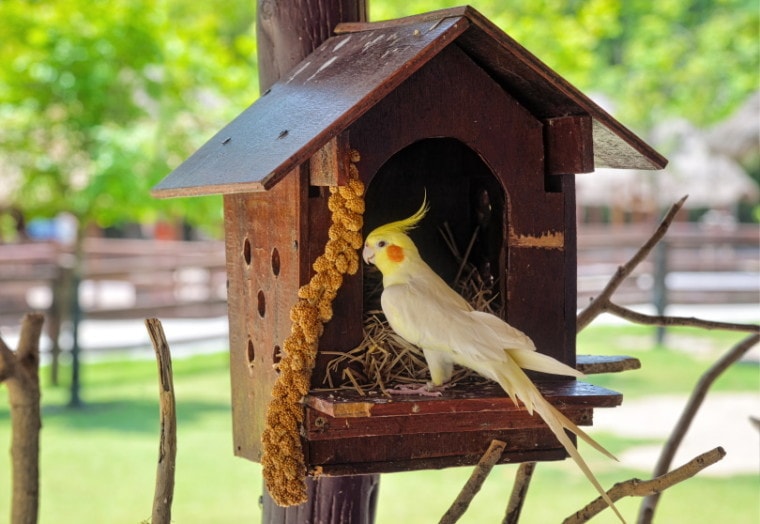
If you’re new to keeping cockatiels, you may be wondering about their egg-laying process. The reproductive cycle of a bird is much different than that of other domesticated animals, so it’s totally normal to have questions about what to expect.
One of the most common questions we get is usually how long it takes for cockatiel eggs to hatch once they are laid. If you’re curious about this as well as signs your hen will lay eggs, and what to expect before and after egg hatching, keep reading. Cockatiel eggs take around 18 to 20 days to hatch after the second or third egg is laid. We’re going to review everything you’ve ever wanted to know about cockatiels and their eggs.
How Will I Know If My Cockatiel Is About to Lay Eggs?
The gravid cockatiel will start spending more time in their nesting box. She may eat more from their cuttlebone and mineral blocks to get the nutrients her body needs to form the eggshell.
Two clear indications that the eggs are on their way are that the hen will begin to have much larger droppings than usual, and the hen’s vent will begin to swell. The vent will take on a round appearance, like an egg, in the hours before the eggs are expelled.
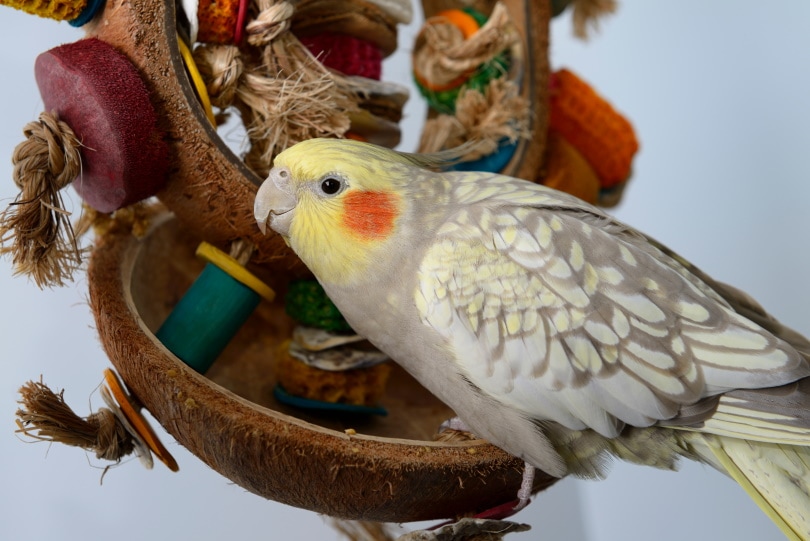
How Long Does It Take for Cockatiel Eggs to Hatch?
After successful mating, the hen can retain male sperm for as long as 2 weeks. This makes it possible to fertilize a complete clutch with just one mating. They lay eggs every two days, and most normal clutches have anywhere between four and six eggs.
Cockatiels don’t usually begin incubating their eggs until after the second or third is laid. The incubation period lasts around 18 to 20 days, and then the hatching will begin. You can expect eggs to hatch every other day just as they were laid.
Though not all incubated eggs will hatch (only around 90% of incubated eggs are actually fertile), you mustn’t remove any eggs in the clutch that did not hatch as expected. Sometimes the incubation period starts later than you may be aware. If you’re not entirely sure of the viability of the egg, you can try candling them.
If you’re new to cockatiel breeding, you’ll need a great resource to rely on. We highly recommend The Ultimate Guide to Cockatiels, a well-researched book you can find on Amazon.
This beautifully illustrated guide will walk you through everything from pairing up your cockatiels to nest boxes, signs of egg laying, troubleshooting, hatching, and more!
What Is Egg Candling?
Egg candling involves shining a light through the egg to determine the state of embryo development. Eggs that are white or pale are easier to candle than those that are dark or speckled. You may need to invest in a high-intensity candler to see through the darker eggs.
If you don’t have a candling device, you can use the water candling method (AKA the float test). Fill a glass halfway with warm water. Take the egg you wish to candle and gently place it into the glass. Observe the egg for a minute or two. If the chick inside is alive, the egg will bob in the water. Be sure to never water candle an egg that has pipped as you risk drowning the chick.
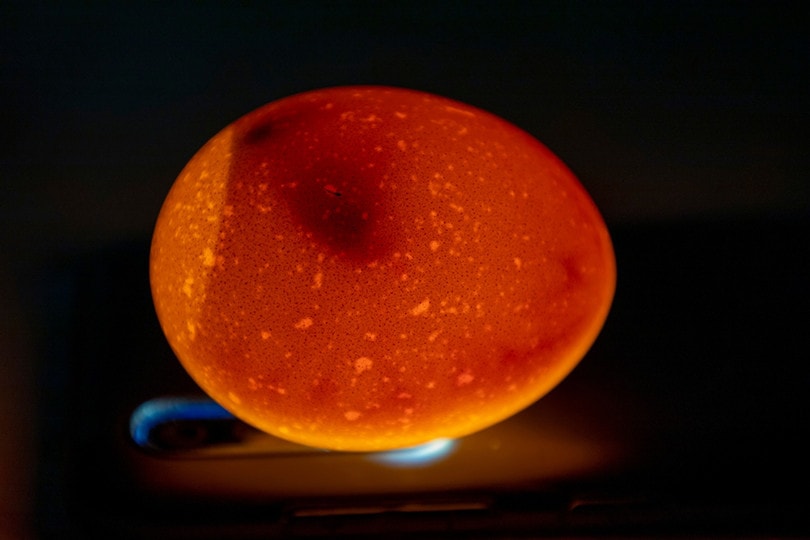
What to Expect Before the Egg Hatches?
Before the egg hatches, you’ll begin hearing the chick inside peeping. The chick has a special egg tooth that they use to peck at their egg. It can take several hours or even as long as two days to peck their way all away around the egg. This is also known as “pipping.” Once a chick has pipped its way around its egg, it can break free.
What to Expect After the Egg Hatches?
The hatching process is very exhausting. It’s completely normal for you to notice chicks resting after all the hard work they’ve done to hatch themselves. The chick’s parents will provide the warmth that it needs to survive. They will not feed the chick for up to 12 hours after hatching as it gets the nourishment it needs when it absorbs its yolk sac. If the chick does not properly absorb the yolk sac, it is unlikely that it will survive.
After that initial 12-hour period, the parents will begin feeding their chicks.

What Happens If the Egg Doesn’t Hatch?
There are several reasons why your cockatiel’s egg didn’t hatch.
Most cockatiels are not mature enough to breed until they’re a year old. Sometimes younger birds will lay eggs, but they will be infertile.
Cockatiels sometimes lay infertile eggs even if they’re fertile. This is simply because the sperm necessary to produce a chick was either missing or just didn’t make it where it needed to be.
Embryo mortality can happen for several reasons, but it commonly occurs when the cockatiel doesn’t have the nutrients necessary to produce healthy eggs.
Remember that just because an egg didn’t hatch after the 21-day incubation period, it doesn’t mean the egg is infertile. Sometimes cockatiel eggs can take up to 25 days to hatch. Give it a few more days before declaring the egg infertile.
- See also: Can Cockatiels Eat Spinach?
How Long Do Baby Cockatiels Need to Stay with Their Mom?
Baby cockatiels rely on both of their parents until they’re around 10-12 weeks old. Cockatiel pairs produce a clutch twice a year. Both parents take active roles in the lives of their babies. Both will sit on the eggs as well as clean and feed the young.
Conclusion
We hope our blog has shed some light on the cockatiel egg-laying and hatching process. It is, of course, much more involved than what we were able to cover in this article. If you’re interested in breeding your cockatiels or have questions about eggs that have been laid and hatched, it’s best to reach out to your vet for advice.
Featured Image Credit: Parinya Feungchan, Shutterstock



